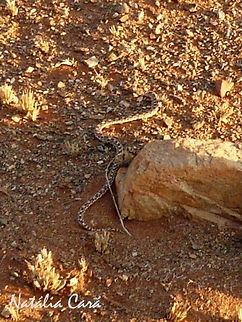
Appearance
It grows to a length of 20–35 inches , and has almost toothless jaws. Dorsally, it has a series of rhomboidal dark brown spots on a lighter background. There is an alternating series of brown spots on each side. Ventrally it is yellowish, either uniform or with dark dots.Naming
Two subspecies are recognized, including the nominotypical subspecies.⤷ ''Dasypeltis scabra loveridgei'' Mertens, 1954
⤷ ''Dasypeltis scabra scabra''
The subspecific name, ''loveridgei'', is in honor of British herpetologist Arthur Loveridge.
Behavior
The rhombic egg eater is nocturnal. Although mainly terrestrial, it is a good climber and is known to scale rock outcroppings and climb trees to raid birds' nests.Habitat
''Dasypeltis scabra'' can be found in a variety of habitats. They are not found in closed-canopy forests nor in true deserts, but do inhabit most ecosystems between these extremes.Reproduction
This species is oviparous. In summer, a sexually mature female may lay one or two clutch of 6-25 eggs each. The eggs measure 36 mm × 18 mm . Hatchlings are 21–24 cm in total length.Food
''Dasypeltis scabra'' feeds exclusively on eggs. The lining of the mouth has small, parallel ridges, very similar to human fingerprints, which aid in grasping the shell of an egg. Once swallowed, the egg is punctured by specialized vertebral hypapophyses which extend into the esophagus. The shell is then regurgitated in one piece, and its contents passed along to the stomach.Defense
When disturbed, the snake inflates itself, "hisses" by rapidly rubbing together the rough, keeled scales on the side of its body, and strikes with its mouth kept wide open.References:
Some text fragments are auto parsed from Wikipedia.